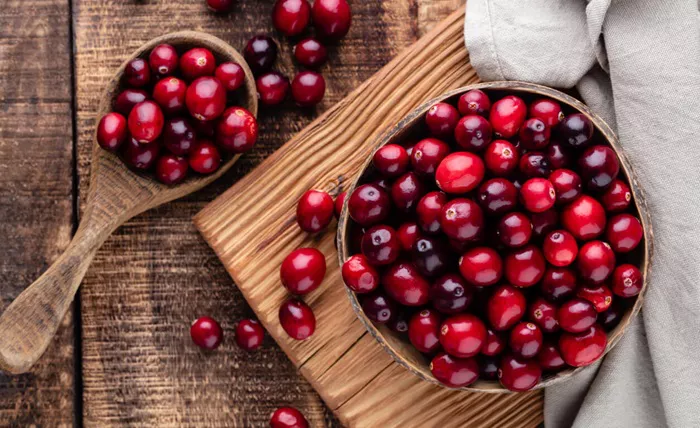Cranberries are a small, tart fruit known for their health benefits. They are rich in antioxidants, vitamins, and minerals that promote overall well-being. But how many cranberries should you eat each day to experience these health benefits? In this article, we will explore the nutritional value of cranberries and provide clear recommendations for daily consumption.
Health Benefits of Cranberries
Cranberries are packed with nutrients that support your health in many ways. Here are some of the key benefits:
1. Rich in Antioxidants
Cranberries are rich in antioxidants, which help fight free radicals in the body. Free radicals can lead to cell damage and increase the risk of chronic diseases. The antioxidants in cranberries, particularly flavonoids and phenolic acids, help reduce inflammation and protect against oxidative stress.
2. Support Urinary Tract Health
One of the most well-known benefits of cranberries is their ability to support urinary tract health. Cranberries contain compounds called proanthocyanidins, which prevent bacteria from sticking to the walls of the urinary tract. This helps reduce the risk of urinary tract infections (UTIs).
3. Promote Heart Health
Cranberries may help lower the risk of heart disease by reducing blood pressure, improving cholesterol levels, and enhancing blood vessel function. The high antioxidant content in cranberries also supports cardiovascular health by reducing inflammation and oxidative damage.
4. Improve Digestive Health
The fiber content in cranberries helps promote healthy digestion. Fiber supports regular bowel movements and maintains a healthy gut. It also helps prevent constipation and supports the growth of beneficial gut bacteria.
5. Boost Immune Function
Cranberries are a good source of vitamin C, an essential nutrient for immune system function. Vitamin C helps protect the body against infections, promotes wound healing, and supports overall health.
suggested Daily Intake of Cranberries
While cranberries offer many health benefits, it is important to consume them in moderation. The recommended daily intake of cranberries depends on various factors, such as age, health status, and diet. Here are some general guidelines:
1. Adults
For adults, the recommended amount of cranberries is about one cup of fresh cranberries or one-quarter cup of dried cranberries per day. This provides a good balance of nutrients and antioxidants without overconsumption of sugar, especially if the dried cranberries are sweetened.
2. Children
For children, the recommended intake of cranberries varies by age. Younger children (ages 1-3) should consume about half a cup of fresh cranberries per day, while older children (ages 4-8) can have about three-quarters of a cup daily. For older children and teens, the amount can increase to one cup per day.
3. Pregnant and Breastfeeding Women
Pregnant and breastfeeding women can benefit from cranberries as they are a good source of essential nutrients like vitamin C and folate. The recommended daily intake is about half a cup to one cup of fresh cranberries per day. However, it is important to consult a healthcare provider before significantly increasing cranberry consumption during pregnancy.
How to Incorporate Cranberries into Your Diet
There are many ways to include cranberries in your diet. Here are some ideas:
1. Fresh Cranberries
Fresh cranberries can be added to smoothies, yogurt, salads, or baked goods. You can also use them in homemade cranberry sauce or simply eat them on their own. Keep in mind that fresh cranberries are tart, so you may want to pair them with sweeter fruits.
2. Dried Cranberries
Dried cranberries are convenient and easy to add to your diet. They can be sprinkled on oatmeal, mixed into trail mix, or added to baked goods like muffins and cookies. However, be mindful of the added sugars in many commercial dried cranberries, as they can contribute to excessive calorie intake.
3. Cranberry Juice
Cranberry juice is a popular way to consume cranberries, but it is important to choose 100% pure cranberry juice without added sugars. If you find pure cranberry juice too tart, dilute it with water or mix it with other fruit juices. You can also make your own homemade cranberry juice by blending fresh cranberries with water and a small amount of natural sweetener.
4. Cranberry Supplements
If you prefer a more concentrated form of cranberries, consider taking cranberry supplements. These are available in capsule, powder, or liquid form and can be a good option for those who have trouble consuming fresh cranberries. Be sure to follow the recommended dosage and consult with a healthcare provider before starting any new supplement.
Potential Side Effects of Cranberries
While cranberries are generally safe for most people, there are a few potential side effects to be aware of:
1. Stomach Upset
Consuming large amounts of cranberries, especially in the form of juice or supplements, can cause stomach discomfort, including nausea or diarrhea. It is best to consume cranberries in moderation to avoid digestive issues.
2. Kidney Stones
Cranberries contain oxalates, compounds that can contribute to the formation of kidney stones in susceptible individuals. If you have a history of kidney stones, it is important to consult with a healthcare provider before increasing cranberry intake.
3. Interactions with Medications
Cranberries may interact with certain medications, including blood thinners like warfarin. If you are taking medication, consult your healthcare provider before consuming large amounts of cranberries to avoid any adverse interactions.
Conclusion
Cranberries are a nutritious fruit that offers a range of health benefits, from supporting urinary tract health to boosting immune function. The recommended daily intake of cranberries varies based on age, health status, and diet, but for most adults, one cup of fresh cranberries or one-quarter cup of dried cranberries per day is sufficient. Remember to consume cranberries in moderation and consult a healthcare provider if you have any health concerns or are taking medications. With their many health benefits, cranberries are a tasty and nutritious addition to your diet.


